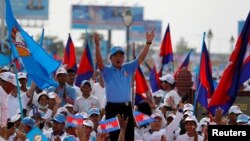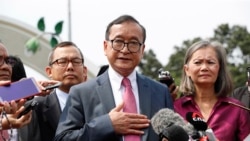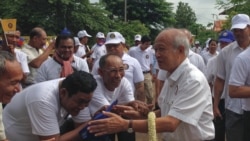Amid a surge in COVID-19 cases, opposition politicians in Cambodia are regrouping and forming new parties ahead of local commune elections to be held next year and general elections in 2023.
Among them are “rehabilitated” past lawmakers from the illegal Cambodian National Rescue Party and the former prime minister, Prince Norodom Ranariddh, who spent three years recovering from a car accident that kept him off of the 2018 ballot.
Last month, former CNRP acting president Pol Horm and senior leader Phan Chansak were “politically rehabilitated” after submitting separate letters of request to the Interior Ministry. Their inclusion will help legitimize elections often derided as rigged by free speech advocates. Phan Chansak has said he will join the Cambodian reform party. Pol has not declared his intentions.
Analysts said the desertions were not expected to stop opposition CNRP leaders such as Sam Rainsy and Mu Sochua, who live in self-exile, campaigning against Prime Minister Hun Sen from abroad.
However, Gavin Greenwood, an analyst with Hong Kong-based security firm A2 Global, said their persistent efforts — including promises to return and lead a popular rebellion — were unlikely to have much of an impact.
“Cambodia has gone, I think in global terms, it’s gone pretty dark,” he said.
He said Sam Rainsy, who faces arrest, was incapable of returning from Europe after airlines bowed to the Cambodian government and refused him passage.
Exiled CNRP figures are unable to generate "a great deal of interest in their countries of exile which would embarrass or in any way affect Hun Sen’s position,” he said.
At least 22 of the banned CNRP politicians have been rehabilitated since mid-April, enabling them to campaign and contest elections for other political outfits, including Hun Sen’s long-ruling Cambodian People’s Party.
They were among 118 opposition officials banned from politics for five years when the Supreme Court dissolved the CNRP in late 2017, allegedly for attempting to overthrow the government after refusing to accept election results in 2013 amid unsubstantiated allegations the poll was rigged.
Since then, hundreds of CNRP supporters have been detained and are before the courts in mass trials, with human rights activists accusing Hun Sen of establishing a dictatorship.
In response the European Union withdrew trade perks afforded Cambodia under its Everything But Arms policy.
Last week, U.S. Deputy Secretary of State Wendy Sherman became the highest-ranking U.S. official to visit Cambodia in five years, meeting with Hun Sen and CNRP leader Kem Sokha, who is awaiting trial in Phnom Penh for treason.
Sherman pressed the government to reopen civic and political space — which along with independent journalism has been severely curtailed — before the commune and national elections.
Phil Robertson, deputy Asia director for Human Rights Watch, said he was not surprised arrests were leading to defections, adding Hun Sen had “always offered a way out,” particularly for CNRP politicians who defected to Hun Sen’s CPP.
“That if someone, who they pressure with repression and harassment and in some cases arrest, is willing to go to the CPP then all is forgiven,” he said.
Robertson added this was a “logical extension” of a pressure campaign mounted against the CNRP inside Cambodia.
“The government is quite clearly trying to wipe out the CNRP,” he said.
“I think that they are trying to eliminate any vestige of it. They are certainly trying to uproot all their networks and they’re even prepared to arrest or imprison people, or have people throw their hands up and join the CPP,” he said.
The CPP won all 125 seats contested at the 2018 ballot, after the CNRP was dissolved. Some 20 parties contested that poll, but human rights groups claimed 16 of them were merely CPP proxies.
Another three opposition outfits — the Khmer Will Party, League for Democracy Party and the Grassroots Democracy Party — all failed to have any impact.
A new list of political parties, including the Cambodian Reform Party, the Khmer Conservative Party and the Cambodian Nation Love Party — all formed from the ranks of former CNRP members — risks splitting opposition votes further, prompting speculation that a coalition could be formed.
Analysts said the return of Ranariddh to the political fray could bolster the chances of any political party, outside of the CPP, winning at least some seats at the national polls in 2023.
According to the government-friendly Khmer Times his royalist Funcinpec party is committed to a merger with the Khmer National United Party and to challenging the CPP.
The Khmer National United Party was established in 2016 by former Funcinpec members upset by their party’s dismal performance over the previous decade and complaints of fraud and corruption.
However, analysts said, none were likely to pose a real threat to the ruling elites.
“All Prime Minister Hun Sen really has to do is not do anything egregious to the opposition and he does, it seems, to be quite clever in terms of how they’ve dealt with the opposition members to date,” Greenwood said.
Another independent analyst, who spoke on condition of anonymity, said the CPP still commands intense loyalty, particularly in the countryside, because it ended a 30-year war in 1998 and none of the political parties can match the CPP in terms of party machinery and reach.
The government also expects to bolster its support by holding the chair of the Association of Southeast Asian Nations next year and the Southeast Asian Games in May 2023, two months before the national election.
“Cambodia has been run as a kleptocracy for decades and at times it has passed the democratic tests and at times it’s failed. At the moment the CPP holds all the cards,” the analyst said.
“This country has been a one-party state since the 2018 election and that is unlikely to change but the inclusion of more political parties will at least add some legitimacy to the next elections,” he said.








